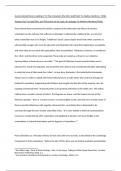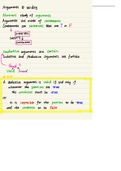A post-colonial theory reading of ‘Is There Nowhere Else We Could Meet’ by Nadine Gordimer, ‘Wide
Sargasso Sea’ by Jean Rhys, and ‘Discourse on the Logic of Language’ by Marlene Nourbese Philip.
Post-colonial theory examines the world in context of the aftermath and effects of western
colonialism on the cultures that suffered. As literature is affected by realities of life, so is true for
when colonialism was at its height. Traditional ‘classic’ pieces depict those from other countries as
otherworldly savages who must be educated and disciplined into what the English deem acceptable,
and when they do not reach this expectation, they are punished. “Blackness, however, is considered
the ‘other’ and therefore to be suspected. Those who are coded as a threat in our collective
representation of humanity are not white.” 1 The goal of Robinson Crusoe towards Friday was to
educate him, teach him etiquette, and mould him into what Crusoe considered tolerable, attempting
to strip him from all that made him ‘other’. In Jane Eyre, Rochester’s first wife Bertha Antoinette
Mason was too other to adapt and hence locked away in an attic where she could not damage her
husband’s reputation. Supposed greats thinkers also bought into this idea of the superior race; for
example, Emmanuel Kant: “Humanity exists in its greatest perfection in the white race. The yellow
Indians have a smaller amount of talent. The Negroes are lower, and the lowest are part of the
American peoples.” Race is a central concern in many English novels, and until very recently many of
them associated blackness with negative characteristics, something that is attempted to be
corrected through the eyes of post-colonialist critics. “It is more helpful to think of postcolonialism
not just as coming literally after colonialism and signifying its demise, but more flexibly as the
contestation of colonial domination and the legacies of colonialism.” 2
Post-colonialism as a literature theory did not exist until very recently, as described in the Cambridge
Companion to Post-colonialism: “before the late 1970s, there was no field of academic specialization
1
Reni Eddo Lodge, ‘What is White Privilege,’ Why I’m No Longer Talking to White People About Race, (London:
Bloomsbury Publishing, 2018), p.1.
2
Ania Loomba, Colonialism/Postcolonialism, (London: Routledge, 2002), p.12.
, that went by the name of “postcolonial studies.” 3 However, that is not to say that no authors before
this period were attempting to dismantle the prejudices of colonialism in literature and even
exploring into the ideas that post-colonialists now research, such as rejecting the prejudices and
stereotypes found in archetypal western literature and exposing the cruelties of colonialism rather
than shying away from those harsher themes. The Cambridge Companion even goes on to agree
with this saying: “to say postcolonial studies as an institutionalized field of academic specialization
did not exist before the late 1970s is not to say that there was no work being done then on issues
relating to postcolonial cultures and societies.” 4 An example of this is Is There Nowhere Else We Can
Meet by Nadine Gordimer, which was written in 1951 before the academic specialization of
postcolonial studies, however it portrays a very accurate depiction of the effects of colonialism and
the extent of prejudices which will be looked at in more depth later on in this essay.
Wide Sargasso Sea by Jean Rhys attempts to correct the colonial treatment of Bertha Antoinette
Mason in Jane Eyre and expose the inherent racism in this classic piece of literature written at the
height of British colonialism. Rhys uses the writing back paradigm, which meant that she was able to
“revise canonical texts and concepts”5 to change the portrayal of Antoinette Mason with the aim of
giving this marginalised and colonised character the accuracy and depth she deserves; “I had always
wanted to write about her … I was annoyed about the poor lunatic West Indian, she’s not a
character at all, unlike Jane Eyre and Mr Rochester, so I wrote her life. Jane and Mr Rochester come
completely to life in Jane Eyre, she doesn’t, she’s just such a horrible character.” 6 Rhys has managed
to have written a story about a girl whose home life was truly awful, with neighbours who hated her
3
Neil Lazarus, ‘Introducing Postcolonial Studies,’ The Cambridge Companion to Postcolonial Literature Studies,
(Cambridge: University Press, 2004), p.1.
4
Neil Lazarus, ‘Introducing Postcolonial Studies,’ The Cambridge Companion to Postcolonial Literature Studies,
(Cambridge: University Press, 2004), p.2.
5
John Marx, ‘Postcolonial Literature and the Western Literary Canon,’ The Cambridge Companion to
Postcolonial Literary Studies, (Cambridge: University Press, 2004), p. 83-96.
6
Jean Rhys and Peter Burton, ‘Jean Rhys: Interviewed by Peter Burton,’ The Transatlantic Review, (1970), 36:
105-109.





